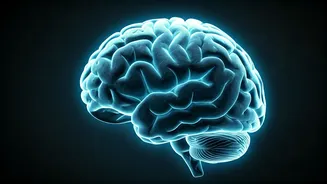Creatine: Beyond Muscles
Creatine, a naturally occurring compound, often finds its place in the realm of fitness due to its impressive ability to boost muscle strength and endurance.
However, the benefits of creatine extend beyond the physical, and recent research is uncovering its significant impact on brain function. Initially recognized for its role in energy production within muscle cells, creatine has a crucial part to play in the brain. The brain requires a significant amount of energy, and creatine helps fuel this vital organ. This is achieved by aiding in the production of adenosine triphosphate (ATP), the primary energy source for cellular activities. With creatine's assistance, neurons can function more efficiently, impacting various cognitive processes like memory, learning, and overall brain health. This wider view is now sparking interest in creatine supplements for their potential to enhance mental acuity and overall well-being, moving it beyond a tool solely for physical prowess.
Brain's Energy Needs
The brain, an exceptionally energy-intensive organ, constantly demands a consistent supply of ATP to function correctly. This energy demand is heightened during cognitive tasks, such as focusing on a complex problem or memorizing new information. The role of creatine in bolstering ATP production becomes crucial here. It supplies the brain with the fuel needed for optimal performance. Creatine's effect on ATP production is especially beneficial for neurons, which require a high-energy supply for various processes. This includes the transmission of signals, maintaining cellular health, and overall cognitive function. Supplementing with creatine can help increase the availability of ATP in the brain, potentially improving mental clarity, focus, and cognitive performance. By ensuring the brain has sufficient energy reserves, creatine supports both short-term cognitive processes, such as problem-solving, and long-term brain health and cognitive resilience.
Cognitive Advantages
The cognitive advantages of creatine are varied, potentially affecting different aspects of brain function. Studies have shown creatine may improve memory, enhance learning capabilities, and accelerate cognitive processing speed. Furthermore, creatine has the ability to shield the brain from stress. It may serve a neuroprotective role by mitigating the effects of oxidative stress and other damage to brain cells. By assisting in the production of ATP, creatine allows neurons to work more efficiently, which is the basic necessity for learning and memory. People taking creatine supplements have reported improved focus and clarity, making it easier to concentrate on tasks. Furthermore, research indicates that creatine could positively impact mood and mental well-being, which has the potential to lessen symptoms of depression. The cognitive benefits of creatine are multifaceted, providing comprehensive support for various brain functions and contributing to a sharp, resilient mind.
Doctor's Perspectives
A medical professional will offer valuable insights into the cognitive benefits of creatine, discussing its effects on the brain. They would address the potential uses and advise on suitable creatine supplementation. The doctor would emphasize the significance of creatine in improving brain health and could explain how it works within the brain. The doctor also provides practical advice on the appropriate creatine dosage and safety considerations for its use. Their perspective would bring clarity to the potential cognitive benefits and the ways of incorporating creatine effectively into daily routines. They might offer recommendations on how to monitor for any side effects and interact with other medications. The doctor could also discuss the latest research findings in support of the cognitive benefits of creatine, offering a well-rounded and trustworthy viewpoint.
Supplementing Creatine Safely
Supplementing with creatine, while generally safe, demands a responsible approach to maximize advantages and minimize possible risks. It is always wise to start with a standard dosage, which is usually around 3-5 grams per day. Adequate hydration is important because creatine helps the muscles retain water. Staying hydrated supports kidney function and overall health. Also, individuals should choose reputable creatine supplements to ensure the quality and purity of the product. Consulting a healthcare professional prior to taking creatine is advisable, particularly for those with underlying health issues or who are taking medications. They can assess your particular situation and advise on the suitability and safe use of creatine. Following these guidelines, you can safely explore the cognitive benefits of creatine, ensuring the best possible outcome.





















